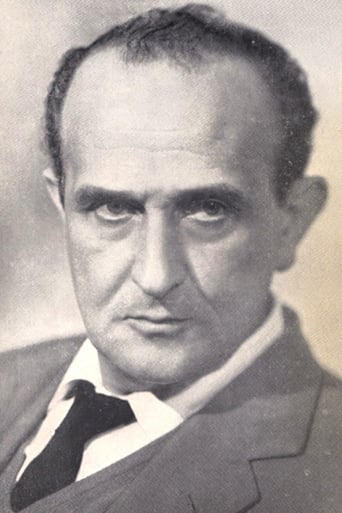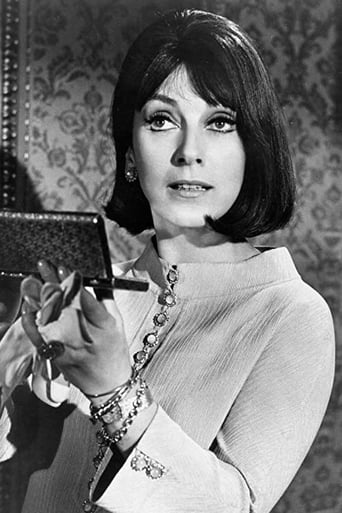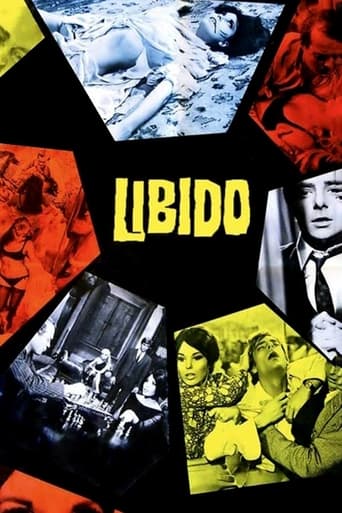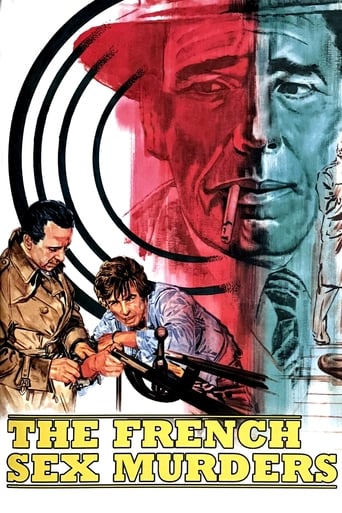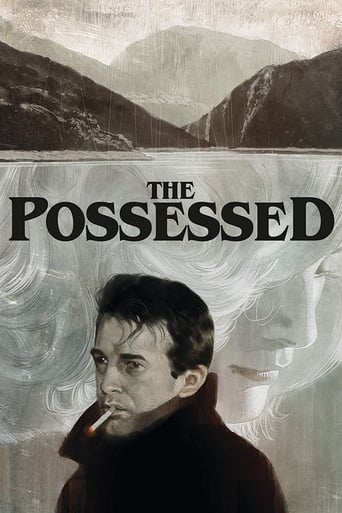
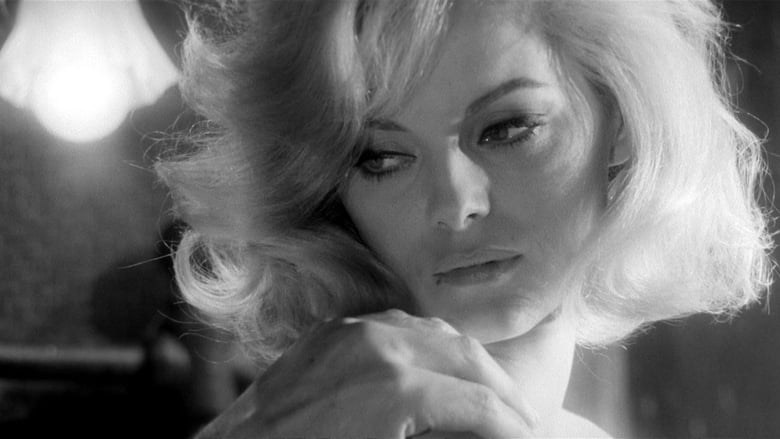
The Possessed (1965)
While visiting his favorite resort village during winter, a writer investigates the apparent suicide of a woman he was infatuated with.
Watch Trailer
Cast
Similar titles

Reviews
Very Cool!!!
Instant Favorite.
Blistering performances.
The movie's neither hopeful in contrived ways, nor hopeless in different contrived ways. Somehow it manages to be wonderful
This movie is about a writer that takes on a trip to the place where he use to go to write in hope of meeting the girl that was maid in the hotel last time he was there.He finds out she is dead and that it possibly is murder and not suicide as the official explanation is. Then he starts to search for the truth about her fate and very few clues is found during the movie and very few events that really make the story interesting. In the end all is explained though.I think the camera work and acting is fine. For me the story was after an interesting start just as exiting to follow as it is to read a newspaper. I would not recommend this movie to people where the story is the important thing. I think it is most for people that enjoy some certain style of black and white movies.
A young writer Bernardo (Peter Baldwin) decides to come back to a small town, set nearby a lake, where he had previously stayed and met a attractive maid and waitress – Tilde (Virna Lisi). The place is desolate then, as the action takes place in winter and the tourist are not particularly interested in this place at this part of the year. Bernardo is in search for peace and quiet and this is why he has an intention of having a rest there and working on his new book. However, after some time it dawns on him that, actually subconsciously, he wants to meet the beautiful waitress. He plans to rediscover her and starts searching, after which he is informed by the owner of the hotel about her mysterious death This is often considered to be one of the earliest examples of giallo genre, along with Blood And Black Lace (1964). In spite of this fact, this cannot be considered, just like later effort by Bazzoni, masterful Footprints On The Moon (1975), to be a typical mystery that made a pattern for all films of this genre, as it differs drastically. In addition to this, the flick is more likely to remind Blow Up (1966) by Antonioni than The Bird With Cristal Plumage (1969) or Deep Red (1975) by Argento. The main character appears to be lost in the world of his own illusions and enquires himself what is real and what is just his imagination, just like David Hemmings in Antonioni's masterpiece. While Michelangelo Antonioni is more interested in general subject of perception and human identity in the world, in which being a witness is a very relative phenomenon, Bazzoni avoids such topics and focuses on delving into Bernardo's mind. Our protagonist himself is not a witness, he's just implicated in a twisted affair surrounding this town. To render psychological aspect even more visible and more articulate, the director utilizes a very slow pace and we can hear our character's thoughts. Owing to this, the viewer is able to follow all the vacillations of the main character and follow all possible ways of Tinde's demise accompanying this mystery envisioned by Bernardo. What is more, Bazzoni exploits black-and-white cinematography which makes things even more fascinating. To sum up, all these elements give it a very distinctive look and it is far from a simplistic murder mystery and the film becomes a sort of a psychological drama. At the end, nothing seems to be concluded and unraveled in detail. In spite of the fact that Bernardo's explanation is the most probable, there are plenty of additional subplots which suggest that many things remain obscure and inexplicable. Thanks to an exceptional editing, chilling sequences of dreams and flashbacks merged together, the ensemble looks terrific.Therefore, nothing is certain in this flick. The whole plot is shown from the Bernardo's point of view, along with his visions and dreams. This render everything not only a murder mystery, but also a great psychoanalysis of the Bernardo's mentality, exposing all his fears, desires and his vague relationship with Tilde whose personality we get to know through his memory. Thus, this subjective nature and unusual perspective make it so extraordinary and riveting. The script itself isn't the biggest advantage of this picture. If it was made by somebody else, it would possibly be a flop. Fortunately, on account of tremendous direction by Bazzoni, his visual style, exquisite taste for creating adequate atmosphere of anticipation and ambiguity, The Possessed (1965) (La donna del lago) is a true gem.The cast is nothing special, but all of the actors manage to achieve a satisfying level of acting artistry. Peter Baldwin, a little known television actor, gives a quite decent performance. There are a couple of familiar faces: such as Phillipe Leroy, known for his roles in Yankee (1966) by Tinto Brass, and Salvo Randone from Investigation of a Citizen Above Suspicion (1970) by Elio Petri. Their roles are rather a minor ones, as Peter Baldwin is the most important character and the action revolves around him.Overall, La donna del lago (1965) might not be as visually striking as gorgeous Footprints On The Moon (1975), nonetheless it's a very impressive little movie that should be more known than actually it is. The story itself is nothing really new, but the way it is executed makes this one refreshing and worth a look. Luigi Bazzoni attaches a great importance to a psychological aspect of characters in the film and owing to this outshines many other flicks in its genre. Now, it remains only a hidden gem and sadly it seems there is no possibility to popularize it in the nearest future. Pity. This deserves to be more prevalent.
First, let's get this out of the way... there are no zombies! No zombie-like characters. No people under the mysterious influence. It's a simple murder mystery with lots of intentional confusion.Second, let me be pretentious for a minute. The dream scenes were stylish, but overwrought. The plot was thin and padded. Characters went nowhere.OK, so what's so great? Honestly, I don't know what to tell you. The acting wasn't first-rate. The locations were passable. The directing was scattershot. The ending was too pat.But... if you didn't read this review first, you might think you were to see a ghost story. So, from that point of view, it's both tense and a letdown. Tense, because you're waiting for the kick in the gut, a letdown because it's just another mad hatter on the loose.Now, I saw the 82m cut, not the purported 95m, so maybe there were some boffo scenes that I missed. Probably not.Hey, is it "proto-giallo"? I watched "Four Flies on Grey Velvet" right before this, so I'll say "maybe." 1965 isn't exactly "proto."
Some people consider this a proto-giallo. It kind of is, in the same way The Girl Who Knew Too Much resembles a giallo, actually it's a 'woman gone missing' mystery shot in black and white where a lot of the usual giallo tropes are absent for the simple reason they had not been mapped down yet; the same movie made ten years later would have probably been shot in garish Technicolor, the murders would take place on screen and we'd be treated to the black-gloved hand of the murderer. A lot of common giallo themes can be found here though, sexual obsession, distorted memory, a chain of events is unlocked when a character visits a place of his past, the boundaries between reality and fantasy/madness blurred by something that may or may not be a product of the mind, yet I'd place the movie closer to the psychological horror Polanski was yet to do than Mario Bava, or a movie that would influence the gialli of Sergio Martino more than those of Dario Argento.If you take it apart to study the parts it was made of, you'll find a lot of familiar ideas reconfigured together in similar ways in other movies. This is the type of movie where a fiction writer (who is "dead inside" by his own admission) arrives at a remote town by a lake to look for a girl who presumably committed suicide a year ago, the town streets are empty and there's talk of a family harboring a "terrible secret", the writer stays at an old hotel where according to the suave-creepy owner "he's the only resident" because it's off-season, at some point a photo of the dead woman is presented that throws a new light into the situation, and there's a mysterious slaughterhouse behind the hotel that looks like the abandoned warehouse Nosferatu hauls his coffin to in Murnau's 1922 film.The movie does a lot of something I find annoying: a scene where people behave in odd ways or has a certain kind of offbeat atmosphere plays out and then we cut to a shot of the writer jolted awake in his bed back at the hotel. Bazzoni is a little too quick to point out "DREAM SCENE!!" to his audience, a little too quick to reassure the viewer that "this part that didn't make sense wasn't really supposed to" so that as the movie begins to morph into something else we're lulled back to the safe environment of the genre picture, where the protagonist can narrate his thoughts in voice-over and where 'dream scene' appears to be the director's way of saying "I want to shoot with the whites washed out".But even that is not what it seems, because at some point we get the flashback of a memory of something that happened in one of the writer's previous stays in the hotel, the writer walks up the stairs and spies on a love scene between the dead woman and a man he can't identify, and we get extreme closeup shots of an eye watching this through a keyhole. Later this memory is expanded upon in the writer's mind and what we saw at first suddenly takes new meaning so that the love scene may had not been a love scene and the victim may had not been the victim after all, but it doesn't become clear whether this is a repressed memory unlocked by circumstance or a wish fulfillment dream, the writer furnishing a twisty conclusion worthy of one of his pulpy books to an incident that remains unexplained and ambiguous like most real life situations usually are. Fittingly this new twist feels very film noir, deceit and greed is involved and for a moment the moral universe of the film is turned on its head.This is what I take from the Lady of the Lake, like the blurry photo that is only a magnified detail of a larger frame, the sense of mystery partially revealed to us for a moment then withdrawn from our eyes again. Now the mystery is ours, literally to inhabit the memory. Or better yet, there's a strange melancholy woman in a white coat who walks by the beachwalk every night by herself and we watch her stroll under the lamp posts from the window of our hotel room. One morning she's found dead and if only we'd have gone down there to talk to her while there was still time.Near the end the movie shifts from eye-level Shining track shots of hotel corridors to vertical shots of the protagonist going down a spiral staircase, the whole geography is now inverted, and we're invited inside the mysterious slaughterhouse for the big reveal. There we get portrait shots steeped in shadow and claw-like hands emerging in silhouette from behind a white glass panel. It's all a bit like we're seeing the seedy industrial locations of Tetsuo through the wintry viewfinder of Sven Nykvyst, or like fetish filmmaker Maria Beatty had brought her inky blacks to the glowy diffused whites of Funeral Parade of Roses.For the end the movie feels the need to explain itself and provide a definitive conclusion, with the villain recounting the whodunit details to the protagonist, and then in very melodramatic fashion a crazed woman is running down the beach, arms flailing wildly. The Italo-horror fan will savour the whole thing start to finish, but there's enough surreal oddity here to make even the Last Year at Marienbad crowd sit down and take notice.

